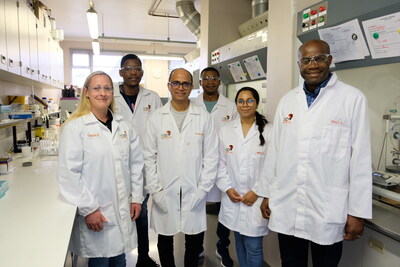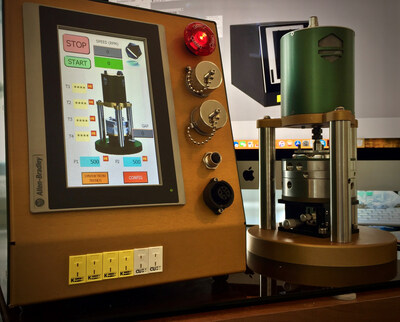In cooperation with Oak Crest Institute of Science based in California, the H3D Foundation is pleased to announce the award of $721,209 USD in funding from the United States Agency for International Development (USAID) through MATRIX, a USAID project to advance the research and development of innovative HIV prevention products for women. The awarded Integrated Special Project (ISP) will support a pilot project aimed at evaluating an innovative continuous flow technology for cost-effective manufacturing of active pharmaceutical ingredients (APIs) in South Africa.”
MATRIX initiated the ISP program to support projects that will add value to and strengthen the capacity of research and development to be conducted in the Global South.
Pharmaceutical manufacturing primarily takes place outside Africa, mainly in high-income countries where collaborating organizations, technology, infrastructure and a critical mass of skilled scientists and technicians are more readily available. In South Africa, the pharmaceutical formulation industry is well developed and produces more than half the final pharmaceutical product consumed locally, though it has not yet developed the capacity to synthesize and manufacture the APIs. In fact, the vast majority of APIs for use as medicines on the African continent must be imported. During the COVID-19 pandemic it became apparent that the local manufacture of APIs should be a high priority.
To address this unmet need, an international group of scientists developed a creative approach that, if successful, could revolutionize the manufacturing of medicines in South Africa, and the rest of the continent. Led by Prof. Kelly Chibale, Founding Director and CEO (H3D Foundation), and Director of the H3D Holistic Drug Discovery and Development Centre at the University of Cape Town (UCT, South Africa), Oak Crest Institute of Science (Oak Crest, United States) in collaboration with industry partners at Chemical Process Technologies Pharma (CPT Pharma, South Africa,) and KinetiChem (United States), the developer of the enabling technology underlying the ambitious project, KinetiChem’s patented chemical synthesis system, the Synthetron™ flow reactor technology.
The pilot project consists of technology transfer and capacity building, facilitated by Oak Crest, to UCT scientists who will deploy a Synthetron system at UCT for the rapid and efficient synthesis of antiretroviral agents used to prevent and treat HIV. Once proof-of-principle has been demonstrated, the technology will be evaluated further by CPT Pharma for possible adoption. The team is confident that successful completion of this pilot project will lead to eventual widespread, decentralized manufacturing of medicines throughout South Africa. Integration with the existing pharmaceutical formulation infrastructure is hoped to eventually democratize access to medicines in South Africa, and beyond, and reduce dependence on outside sources.
The Synthetron reactor technology allows for continuous flow chemical synthesis, and compared to conventional methods, requires very small reaction volumes (0.25 mL, approximately five drops) to complete a chemical reaction, and in only fractions of a second. These highly efficient systems facilitate rapid scale-up of reactions, with bench-scale systems producing multi-kilogram quantities of product in less than one hour. These systems take up a fraction of the space that typical batch reactors require (typically less than a 1×2 meter footprint), can accommodate a wide range of reaction conditions, and require a much lower capital investment than traditional batch manufacturing systems.
“It is one thing to talk about local manufacturing, it is another to have the relevant technology and skills. This collaboration will facilitate both technology transfer and on-the-job-training skills development. It also illustrates the importance of research and development (R&D) creating the demand and playing a crucial role in seeding new industrial development that is so crucial for absorbing the abundant labour force available in South Africa,” said Prof. Chibale, H3D Foundation.
“A successful API manufacturing industry in South Africa requires cost competitive technology; without that local manufacturing is not feasible. To develop and implement new manufacturing technologies requires skills that are currently not freely available on the African continent. We are very excited to be part of this project, which will address both critical success factors for our business and industry,” said Dr. Hannes Malan, Managing Director, CPT Pharma.
MATRIX, and the ISP pilot study, were made possible by the generous support of the American people through the U.S. President’s Emergency Plan for AIDS Relief (PEPFAR) and the U.S. Agency for International Development (USAID).
About the team members:
H3D Foundation: H3D Foundation is a nonprofit organization that was established in 2019 to build on the success of the University of Cape Town Holistic Drug Discovery and Development (H3D) Centre’s capacity development programs. H3D Foundation aims to position Africa as a global player in innovative pharmaceutical R&D by building infrastructure as well as the skills of scientists and researchers based in Africa. Moreover, one of the key elements in the mission of the H3D Foundation is to advocate for the use of science in job creation and to create an absorptive capacity to identify, attract, develop, nurture and retain talent in drug discovery related sciences across the African continent. Learn more at www.h3dfoundation.org.
Founded in 1998, and celebrating its 25th anniversary in 2023, Oak Crest Institute of Science is a 501 (c)3 non-profit organization established to conduct innovative research in biology and chemistry with a focus on biomedical and environmental science, while providing an educational platform for teachers and students. Learn more at: www.oak-crest.org.
Chemical Process Technologies Pharma (Pty) Ltd (CPT Pharma): To meet the need for local manufacturing of pharmaceutical API’s, Chemical Process Technologies Pharma (Pty) Ltd (CPT Pharma) was established in 2014. CPT Pharma developed cost competitive technologies for the manufacturing of various APIs and obtained funding from the South African government’s Department of Science and Innovation (DSI) and the Industrial Development Corporation (IDC) from South Africa for the construction of a pilot plant. The plant was successfully commissioned and GMP certified by the local regulatory authority, SAHPRA. Learn more at: www.chemprotech.co.za.
KinetiChem, Inc.: To advance the emerging field of continuous chemical processing, KinetiChem (KC) was established in 2004. KC focused on overcoming continuous processing challenges through the use of its innovative spinning disk reactor technology, the Synthetron. Persistent chemical engineering developments have brought the Synthetron technology to the forefront of continuous processing by enabling kilograms per hour production rates with a system that utilizes fractions of a milliliter of reaction volume while only occupying a footprint of a few square feet. To learn more about this powerful technology and how it can reshape global manufacturing efforts please visit: www.KinetiChem.com.
MATRIX is a five-year, $125 million cooperative agreement funded by the U.S. Agency for International Development (USAID) in 2021. MATRIX is being implemented by Magee-Womens Research Institute (MWRI) in Pittsburgh, Pennsylvania, USA, in close collaboration with partner organizations from North America and Africa. The mission of MATRIX is to expedite the research and development of a range of HIV prevention products for women that in addition to being safe and effective, will be acceptable, affordable, scalable and deliverable in the settings where they are needed most. Learn more at: www.matrix4prevention.org.












